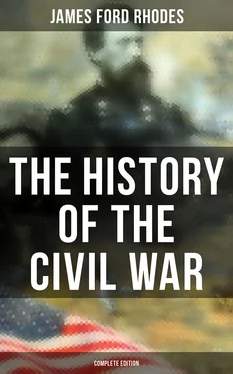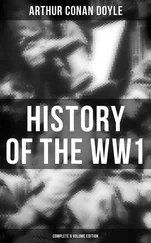James Ford Rhodes - The History of the Civil War (Complete Edition)
Здесь есть возможность читать онлайн «James Ford Rhodes - The History of the Civil War (Complete Edition)» — ознакомительный отрывок электронной книги совершенно бесплатно, а после прочтения отрывка купить полную версию. В некоторых случаях можно слушать аудио, скачать через торрент в формате fb2 и присутствует краткое содержание. Жанр: unrecognised, на английском языке. Описание произведения, (предисловие) а так же отзывы посетителей доступны на портале библиотеки ЛибКат.
- Название:The History of the Civil War (Complete Edition)
- Автор:
- Жанр:
- Год:неизвестен
- ISBN:нет данных
- Рейтинг книги:5 / 5. Голосов: 1
-
Избранное:Добавить в избранное
- Отзывы:
-
Ваша оценка:
- 100
- 1
- 2
- 3
- 4
- 5
The History of the Civil War (Complete Edition): краткое содержание, описание и аннотация
Предлагаем к чтению аннотацию, описание, краткое содержание или предисловие (зависит от того, что написал сам автор книги «The History of the Civil War (Complete Edition)»). Если вы не нашли необходимую информацию о книге — напишите в комментариях, мы постараемся отыскать её.
This Pulitzer Prize winning book remains one of the best histories on the topic of American Civil War to this day. For the purpose of writing this comprehensive work, the author used the most authoritative documents and sources including Personal Traits of Lincoln, Life and Letters of General Meade, Diary of Gideon Welles, The Reminiscences of Carl Schurz and Official Records of the Union and Confederate Navies.
The History of the Civil War (Complete Edition) — читать онлайн ознакомительный отрывок
Ниже представлен текст книги, разбитый по страницам. Система сохранения места последней прочитанной страницы, позволяет с удобством читать онлайн бесплатно книгу «The History of the Civil War (Complete Edition)», без необходимости каждый раз заново искать на чём Вы остановились. Поставьте закладку, и сможете в любой момент перейти на страницу, на которой закончили чтение.
Интервал:
Закладка:
Beauregard's aides assumed too great a responsibility in giving the order to fire the first shot; they should have referred Anderson's reply to their chief. There can be no doubt that the Confederate States would have obtained peacefully on Monday what they got by force on Sunday. If Beauregard had had Anderson's last response, he would unquestionably have waited to ask Montgomery for further instructions. The presence of the United States fleet was of course disquieting; yet the danger from this source, even as exaggerated in Beauregard's mind, could be averted quite as well by acting on the defensive, as by the bombardment of Fort Sumter. 48But South Carolina was hot for possession of the fort and the aides who gave the order that precipitated hostilities were swayed by the passion of the moment.
In April, 1861, war was undoubtedly inevitable. The House divided against itself could not stand. The irrepressible conflict had come to a head; words were a salve no longer. Under the circumstances it was fortunate for Lincoln that the South became the aggressor. Davis's elaborate apology 49and the writing inspired by it could never answer the questions put by Northern to Southern soldiers, when they met under a flag of truce or in the banter between Confederates and Federals when opportunities offered, "Who began the war? Who struck the first blow? Who battered the walls of Fort Sumter?" 50"At one stamp of his foot, the President called the whole nation to arms," wrote Henry Adams in 1861 while in Washington. 51He referred to the Proclamation asking for 75,000 volunteers whose first service would probably be "to repossess the forts, places and property which have been seized from the Union." Lincoln wrote this on the Sunday when Anderson marched out of Sumter (April 14) and, following closely the act of February 28, 1795, his authority, he called forth that number of militia, apportioned among twenty-seven States, to suppress, in the seven cotton States, combinations beyond "the ordinary course of judicial proceedings," and he summoned Congress to meet on July 4 in special session. In the particulars communicated by the War department to the several governors, the time of service was fixed at three months, but this represented in no way the President's opinion as to the probable duration of the war; he was simply following the act of 1795 which provided that the militia could be held to service for only thirty days after the next meeting of Congress.
After two days full of indignant outbursts at the insult to the flag, the people of the North read the President's call for troops. "That first gun at Sumter," wrote Lowell, "brought all the free States to their feet as one man." "The heather is on fire," said George Ticknor. "I never before knew what a popular excitement can be. At the North there never was anything like it." 52Governors, legislatures, wherever these were in session, and private citizens acted in generous coöperation. Men forgot that they had been Republicans or Democrats; the partisan was sunk in the patriot. Washington was supposed to be in danger of capture by the Southern troops flushed with their victory at Sumter; armed and equipped soldiers were needed for its defence. The Sixth Massachusetts was the first regiment to respond, leaving Boston on April 17 and arriving in Baltimore two days later. The only approach by rail to Washington was through Baltimore where the strong feeling for secession was vented in threats that Northern troops, bent on the invasion of the South, would not be permitted to pass through its streets. The Colonel of the Sixth, being informed in Philadelphia of the situation, timed his arrival in Baltimore for the morning (April 19). Here a transfer was usually made by means of horses, drawing the passenger cars through the streets from the Philadelphia to the Washington station, a mile distant, where a change was made to the cars of the Baltimore and Ohio railroad, which owned the forty miles of single track to the nation's capital. Seven companies were thus driven rapidly through the city. Meanwhile an angry mob had collected, torn up the railroad and erected a barricade to dispute the passage of the rest of the regiment. Informed of this the captains of the four remaining companies decided that they must march to the station; but before they had started, up came the mob, carrying a secession flag and threatening that, if an attempt were made to march through the streets, every "white nigger" of them would be killed. The Captain, on whom the command devolved, gave the order to march, a policeman leading the way. As the soldiers stepped forward, they received a volley of brick-bats and paving-stones from the mob; a hundred yards farther on they came to a bridge which had been partially demolished. "We had to play scotch-hop to get over it," said the Captain. The order "double-quick" was then given, which led the mob to believe that the soldiers either had no ammunition or dared not use it. In their growing rage, they fired pistol-shots into the ranks, and one soldier fell dead. The Captain gave the order "fire"; a number of the mob fell. The mayor of Baltimore arrived and placed himself at the head of the column. "The mob grew bolder," he wrote, "and the attack became more violent. Various persons were killed and wounded on both sides." As his presence failed to allay the tumult, the mayor left the head of the column, but the four companies marched on, fighting their way through to their comrades, aided by the city marshal with fifty policemen who covered their rear. In the Baltimore and Ohio cars with the blinds closed, the regiment received a volley of stones which so infuriated one of the soldiers that he fired and killed a prominent citizen, a mere looker-on. Finally the train got away and reached Washington late in the afternoon. Of the regiment four had been killed and thirty-six wounded. The casualties in the mob were larger.
In Baltimore the excitement was intense. "The streets are red with Maryland blood" are the marshal's words. Secessionists and Southern sympathizers were rampant; stifling the Union sentiment of the city, they carried everything with a high hand and dictated the action of the constituted authorities. "The excitement is fearful. Send no more troops here," is the joint despatch of the governor of Maryland and the mayor of Baltimore to the President. So great was the commotion that a part of the State and city military was called out; citizens volunteered, and, after being more or less adequately furnished with arms, were enrolled for the purpose of defence under the direction of the board of police. In Monument Square a mass-meeting assembled, whose sentiment was decidedly opposed to any attempt at coercion of the Confederate States. Apprehending "a severe fight and bloodshed" if more Northern troops attempted to pass through Baltimore, the mayor and city marshal ordered the burning of certain bridges on the Philadelphia, Wilmington and Baltimore railroad, the line to Philadelphia, and on the Northern Central, the line to Harrisburg; three bridges on each railroad were burned, thus completely severing the rail communication with the North. 53
The seven days since the evacuation of Sumter had been crowded with events of a deeply ominous character. On April 17, the Virginia convention, sitting in secret, had passed an ordinance of secession, an act which became known to the authorities in Washington on the following day. As a rejoinder to Lincoln's call for 75,000 troops, Jefferson Davis by proclamation invited applications for letters of marque and reprisal against the merchant marine of the United States. The President retorted (April 19) by proclaiming a blockade of Southern ports from South Carolina to Texas inclusive, and declaring that privateers acting "under the pretended authority" of the Confederate States would be treated as pirates. On the 18th, the United States commander at Harper's Ferry in Virginia, deeming his position untenable, abandoned it after demolishing the arsenal and burning the armory building. On the 20th the Gosport navy-yard was partially destroyed by the Union forces and left to the possession of the Virginians. On the same day Robert E. Lee, who was esteemed by Scott the ablest officer next to himself in the service, and who had been unofficially offered the active command of the Union army, resigned his commission, thus indicating that he had decided to cast his lot with the South. The gravity of the situation was heightened by the severance of communications between the national capital and the North, as a result of the trouble in Baltimore. 54On Sunday night (April 21) the telegraph ceased to be available. The only connection the government now had with its loyal territory and people was by means of private couriers; these made their way with difficulty through Maryland, where for the moment an unfriendly element prevailed. Correct information was difficult to get, and rumors of all sorts filled the air. The government and citizens alike were apprehensive of an attack on the capital. They feared that Beauregard's South Carolina army would be transported North as fast as the railroads could carry it and, reënforced in Richmond by Virginia troops, would easily take Washington. Preparations were made to withstand a siege. Panic seized the crowds of office-seekers, driving them northwards. Many secessionist citizens, fearing that the whole male population of the city would be impressed for its defence, left for the South. Washington, wrote General Scott, on April 22, is "now partially besieged, threatened and in danger of being attacked on all sides in a day or two or three." The arrival of the Eighth Massachusetts and Seventh New York at Annapolis, who had finished their journey to that point by water, prompted the governor to telegraph to the President advising that "no more troops be ordered or allowed to pass through Maryland"; and he suggested "that Lord Lyons [the English minister] be requested to act as mediator between the contending parties of our country." 55
Читать дальшеИнтервал:
Закладка:
Похожие книги на «The History of the Civil War (Complete Edition)»
Представляем Вашему вниманию похожие книги на «The History of the Civil War (Complete Edition)» списком для выбора. Мы отобрали схожую по названию и смыслу литературу в надежде предоставить читателям больше вариантов отыскать новые, интересные, ещё непрочитанные произведения.
Обсуждение, отзывы о книге «The History of the Civil War (Complete Edition)» и просто собственные мнения читателей. Оставьте ваши комментарии, напишите, что Вы думаете о произведении, его смысле или главных героях. Укажите что конкретно понравилось, а что нет, и почему Вы так считаете.












